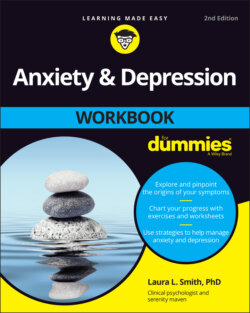Читать книгу Anxiety and Depression Workbook For Dummies - Laura L. Smith - Страница 15
When and Where to Get More Help
ОглавлениеSelf-help tools benefit almost everyone who puts in the effort. Many people find they can overcome minor to moderate emotional problems by working with books like this one. Nevertheless, some difficulties require professional help, perhaps because your anxiety or depression is especially serious or because your problems are simply too complex to be addressed by self-help methods.
Work through The Serious Symptom Checklist in Worksheet 1-15 to find out if you should seriously consider seeking treatment from a mental health professional.
Worksheet 1-15 The Serious Symptom Checklist
| I have thoughts about killing myself.I feel hopeless.My sleep has been seriously disturbed for more than two weeks (including sleeping too little or too much).I have unbearable pain.I’m a horrible burden to my family.My partner left me for another, and I can’t take the humiliation anymore.I feel out-of-control anger toward someone and want to seek violent revenge.My life is worthless, and I have no reason to live.I’ve gained or lost more than a few pounds without trying to do so.I’m ignoring major responsibilities in my life, such as going to work or paying bills.I’m hearing voices.I’m seeing things that aren’t there.My drug use or drinking are interfering with my life.My thoughts race, and I can’t slow them down.Someone I trust and care about has said I need help.I’ve been getting into numerous fights or arguments.I’ve been making really poor decisions lately (such as making outlandish purchases or getting involved in questionable business schemes).Lately I’ve felt that people are out to get me.I haven’t been able to get myself to leave the house except for absolute essentials.I’m taking risks that I never did before.Suddenly I feel like I’m a special person who’s capable of extraordinary things.I’m spending considerably more time every day than I should repeating actions such as hand washing, arranging things, and checking and rechecking things (appliances, locks, and so on).I have highly disturbing flashbacks or nightmares about past trauma that I can’t seem to forget about. |
Checking off any one item from the list means that you should strongly consider a professional consultation. Furthermore, please realize that no such list can be all-inclusive. If you’re really not sure if you need help, see a mental health professional for an assessment.
If you feel like ending your life, the suicide hotline is a quick and anonymous way to get immediate help. In the United States, the number is 800-273-8255 or 800-273-TALK. Trained counselors will talk to you 24/7. You can call the number even if you feel helpless or hopeless or not suicidal. Staff will offer support and local information. If you prefer, text 741741 and text hello or help. You will get an immediate response. Launching in July 2022, the suicide hotline can be reached by dialing 988.
If you checked one or more of the statements above and you’re not suicidal but are beginning to think that perhaps you need help, where should you go? Many people start with their primary care provider, which is a pretty good idea because your provider can also determine if your problems have a physical cause. If physical problems have been ruled out or treated and you still need help, you can:
Ask your primary care provider for a recommendation.
Check with your state’s psychology, counseling, social work, or psychiatric association.
Call your insurance company for recommendations.
Ask trusted friends or family for recommendations.
Contact your local university department of psychology, social work, counseling, or psychiatry for a referral.
Either before or during your first session, talk to the mental health professional and ask if you’ll receive a scientifically validated treatment for anxiety or depression, such as Cognitive Behavioral Therapy, Acceptance and Commitment Therapy (ACT), Emotion Focused Therapy, or Interpersonal Therapy. Unfortunately, some practitioners lack necessary training in therapies that have shown effectiveness in scientific studies. Also, make sure whoever you see is a licensed mental health practitioner.
Understanding and accepting that you need more help is a sign of strength, not weakness. It takes bravery to admit that you might have a problem with your emotions, and it takes courage to seek a resolution.
At this point, you should pat yourself on the back. Whether this is the first chapter you’ve read or not, you’ve made a good start. Every minute you spend with this workbook is likely to improve your mood. Just give it a little time.
